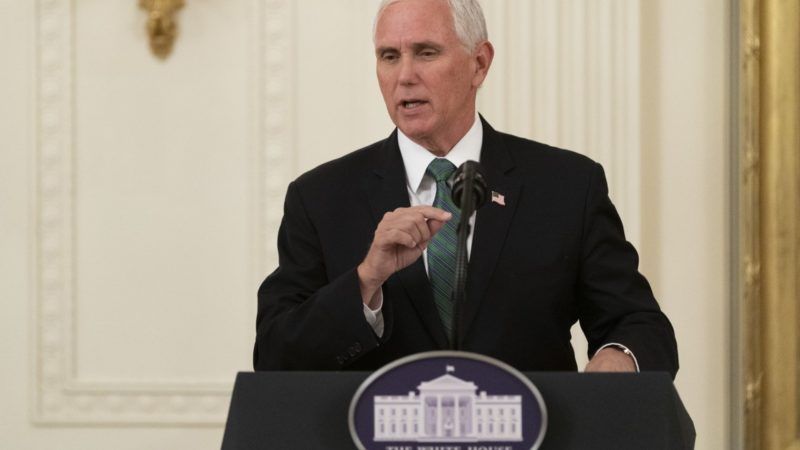Mike Pence Comes Out Against Marijuana Banking Bill That Would Actually Save Taxpayers Money
The SAFE Banking Act is not a pork-barrel spending bill. Is that why it’s struggling?

Vice President Mike Pence took to Lou Dobbs Tonight on Fox News earlier this week to gripe that Democrats were attempting to include legislation related to marijuana and banking in the latest coronavirus relief bill.
"I heard the other day the bill mentions marijuana more than it mentions jobs," Pence said to Dobbs. "The American people don't want some pork-barrel bill coming out of the Congress when we've got real needs for working-class families."
Maybe he's trying to remind everybody that Joe Biden isn't the only vice president who's still resisting marijuana legalization?
There are two ironies here. First, the bill Pence is complaining about makes it possible for cannabis businesses to safely engage in banking in states where cannabis is legal, which helps those "working-class families" who rely on the cannabis industry. Second, the bill he's referring to will actually save taxpayers money, unlike much of the rest of this relief legislation.
The "Secure and Fair Enforcement Act of 2019," a.k.a. the "SAFE Banking Act," would allow legally operating cannabis businesses to have the same legal access to banks, loans, and deposit protections as other legal businesses. Because the sale and possession of marijuana are still forbidden by federal law, banks are reluctant to have any dealings with dispensaries and growers, even when they're legally operating within their home states.
This is not a pork-barrel bill. While the marijuana industry would love to have access to federal coronavirus relief, the SAFE Banking Act would allow them only to use banking services the way other businesses do. According to the Congressional Budget Office, passing the bill would actually reduce the federal deficit by $2-3 million dollars a year. This is small potatoes in the grand scheme of things (the federal deficit for 2020 stands so far at $2.8 trillion), but as Reason Foundation Policy Analyst Jacob James Rich observes, legal banking creates a framework for the expansion of the cannabis industry and also improves bookkeeping and revenue and income reporting. Both of those actions ultimately lead to more commerce and more revenue for the government:
Issues of underreported marijuana income are endemic across all municipalities and states that have regulated cannabis. This should come as no surprise since cash-based businesses tend to underreport their incomes by 50% in general, which might be even larger in the marijuana industry as suppliers transition from illegal to regulated markets. Additionally, employees of cash-based businesses tend to report less than 20% of their incomes to the Internal Revenue Service (IRS). The best way to address these issues would be to allow marijuana businesses access to banking services, which provide much better records for accounting purposes.
The country is in a recession and experienced an unprecedented 32.9% drop in gross domestic product (GDP) for the second quarter of 2020—due largely to the coronavirus pandemic and the economic lockdowns many state and local governments implemented. While seeking to grapple with the pandemic, recession—and eventually needing to confront the nation's unsustainable spending, both conservative and liberal policymakers in Congress should consider provisions, like marijuana banking law reforms, that could help the economy, state and local governments, small businesses, and be a net positive to the federal budget.
Pence and Sen. Majority Leader Mitch McConnell (R–Ky.) are using the SAFE Banking Act as a cudgel to accuse House Speaker Nancy Pelosi (D–Calif.) of including "non-germane" content in coronavirus relief legislation. Back in May, when the House previously attempted to add the SAFE Banking Act to coronavirus legislation, McConnell took the same approach as Pence is taking now, mocking the bill for referencing "cannabis" more than it references "jobs," which is a cheap and lazy way to score points. The number of times a bill uses a particular word is not a good indicator of what the bill does.
The SAFE Banking Act passed the House last September, 321-103. Only one Democrat (Terri Sewell of Alabama) voted against it, while 90 Republicans supported it. Thanks to McConnell, it hasn't been taken up by the Senate, despite having the support of fellow Republican and Kentuckian Sen. Rand Paul, who tweeted in support of it just yesterday.
While there are myriad issues with the federal government's coronavirus relief efforts, allowing state-legal cannabis businesses to use banking services is not one of them.


Show Comments (21)